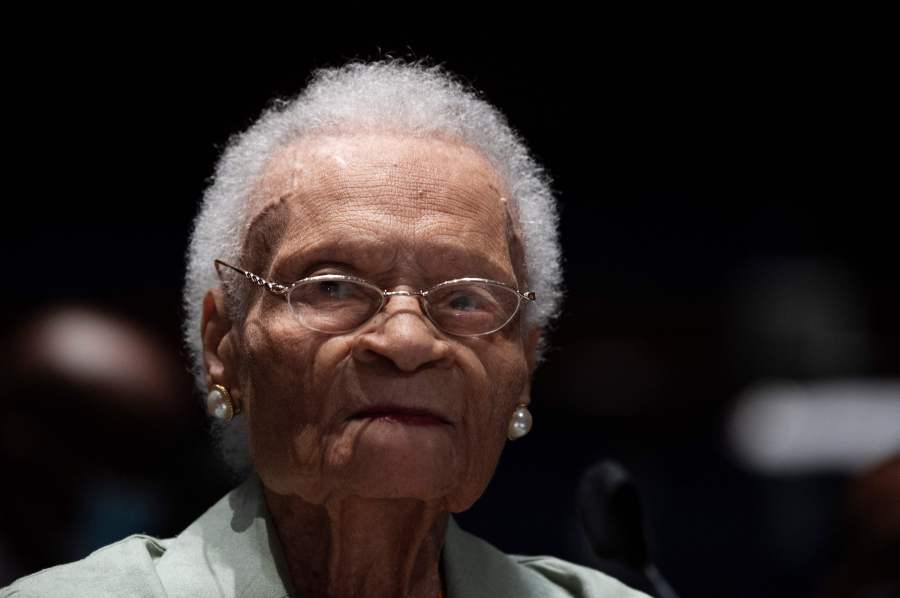‘I have never seen justice’: Tulsa Race Massacre survivors share stories of chaos, horror
OKLAHOMA CITY (KFOR) — For the first time, the American public is hearing from survivors of one of the darkest events in American history.
It has been nearly 100 years, but city leaders in Tulsa say they are still searching for closure after the Tulsa Race Massacre.
The Greenwood District in Tulsa, Oklahoma was once called the “Black Wall Street,” a 35-block radius in the segregated community that was thriving with hundreds of businesses.

But, on May 31 through June 1, 1921, the entire area was burned down as a white mob attacked the community after a black man was accused of assaulting a white woman.
White residents burned down homes and businesses, killing hundreds of black residents and injuring 800 others.
Despite it being one of the worst instances of racial violence in the United States, the massacre was mostly swept under the rug.
Even though it’s been nearly 100 years since the attack, leaders say the community never fully recovered.
Businesses were never able to rebuild, and innocent families were not compensated for the losses caused by the mob.
Although there are estimates regarding the casualties that occurred during the attack, officials have been working for more than a year to find all of the victims.
On Wednesday, a U.S. House Subcommittee held a hearing to examine the 1921 Tulsa Race Massacre and hear from survivors ahead of the 100-year anniversary of the event.

“I am here seeking justice and I am asking my country to acknowledge what happened in Tulsa in 1921,” said Viola Fletcher.
Viola Fletcher was just 7-years-old when the Tulsa Race Massacre occurred on May 31, 1921.
“I went to bed in my family’s home in Greenwood. The neighbors of Tulsa, the neighborhood I fell asleep in that night was rich, not just in terms of wealth but in culture, heritage, and my family had a beautiful home. We had great neighbors and I had friends to play with. I felt safe. I had everything a child could need. I had a bright future ahead of me. Greenwood could have given me the chance to truly make it in this country. In a few hours, all of that was gone,” said Fletcher.

“The night of the massacre, I was awakened by my family. My parents and five siblings were there. I was told we had to leave and that was it. I will never forget the violence of the white mob when we left our home. I still see Black men being shot, Black bodies in the street. I still smell smoke and see fire. I still see Black businesses being burned. I still hear airplanes flying ahead. I hear the screams. I have lived through the massacre every day,” she said.
Although her family survived the violence in 1921, she says they never fully recovered.
“Our country may forget this history, but I cannot, I will not, and other survivors do not, and our descendants do not,” she said.
Fletcher’s family was forced to leave Tulsa, which meant losing out on an education for her. She says she never finished school past the fourth grade.
For most of her life, she worked as a domestic worker, serving white families.
“I am 107-years-old and I have never seen justice. I pray that one day I will,” said Fletcher.

Hughes Van Ellis, who is 100-years-old, says his family was driven from their home and was left with nothing after the massacre.
“We live with that every day and the thought of what Greenwood was and what it could have been. We aren’t just black and white pictures on a screen. We are flesh and blood. I was there when it happened and I’m still here,” said Van Ellis.
Even though he fought in World War II, he says he came back to a country that was segregated and he would never get the same compensation as white soldiers because of the color of his skin.
“We are not asking for a hand out. All we ask for is a chance to be treated like a first class citizen,” he said.
Lessie Benningfield Randle is 106-years-old and says she is still haunted by what happened on May 31, 1921.
When she was just 6-years-old, Randle lived in the Greenwood District with her grandmother.
“I was a young child and I felt very safe. My community was beautiful. It was filled with happy and successful Black people. Then everything changed. It was like a war; white men with guns came and destroyed my community. We couldn’t understand why. What did we do to them? We didn’t understand. We were just living. But they came and they destroyed everything. They burned houses and businesses. They just took what they wanted out of the buildings, then they burned the buildings. They murdered people. We were told they just dumped the dead bodies into the river,” said Randle.

“I remember running outside of our house. I just passed dead bodies. It wasn’t a pretty sight. I still see it today in my mind 100 years later. I was so scared, I didn’t think we could make it out alive. I remember people were running everywhere. We waited for the soldiers to come, and when they finally came, they took us to the fairground where we were safe,” she said.
Randle says once all the businesses and homes were destroyed, most families were left with nothing.
“I survived the 1921 Tulsa Race Massacre and I have survived 100 years of painful memories and losses. By the grace of God, I am still here,” she said.










